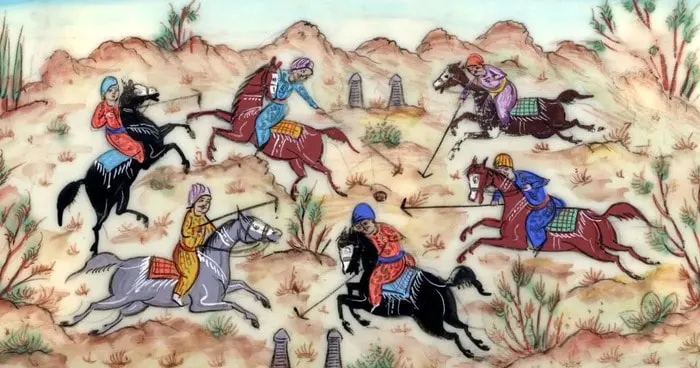13. Hopscotch
In India, the game of hopscotch is known by many names including Paandi, Potsy, and Kunte Belle.
According to sources, Paandi appears to be the most common name for hopscotch in India.
The game of Paandi is believed to have originated from ancient Roman times when it was brought to India. Over time, it was adapted to local customs and traditions and different regional variations emerged across India with localized names.
The original hopscotch courts were over 100 feet long and used for military training exercises.
Roman foot soldiers ran the course in full armor and field packs to improve their footwork, and Roman children later imitated this, drawing their own smaller courts and adding a scoring system.
The English term “Hopscotch” comes from “hop” meaning “to jump” and “escocher,” an Old French word meaning “to cut” or “scratch”.
The game is believed to have been played in ancient India and is listed among the games prohibited by Buddha.
12. Gilli Danda
Gilli Danda is a precursor to cricket, with the ball replaced by the gilli. It is a popular game in rural India, with variations in name and scoring method.
The game is also known as dānggűli, chinni-kolu, kottiyum kolum, vitti Dandu, kitti pul, and Gooti-Billa in different parts of India.
11. Tug-of-War
There is archaeological evidence of the game being played in the 12th century AD in the state of Orissa, on the east coast of India.
The game was also popular among the Mughal emperors and the British army in India.
However, India is not the only possible origin of tug of war, as the sport was also found in Cambodia, ancient Egypt, Greece, and China.
Therefore, it is hard to say definitively that tug of war originated in India, but it is certainly one of the oldest places where the game was played.
10. Kho kho
A tag sport that involves two teams of nine players each, where one team tries to chase and tag the members of the other team, who try to avoid them. It is one of the oldest traditional games of India, and is played in schools and colleges across the country.
9. Badminton
A racket sport that involves hitting a shuttlecock across a net. It is derived from an older game called Poona, which was played by British officers in India in the 19th century. The name badminton comes from the Badminton House in England, where the game was first played.
8. Carrom
A tabletop game that involves flicking a striker to hit and pocket wooden disks called carrom men. It is similar to billiards, but played with the fingers. It is said to have originated in India or Burma, and is widely played in South Asia and other parts of the world.
7. Kabaddi
A contact sport that involves two teams of seven players each, where one player from the attacking team tries to touch as many defenders as possible without being tackled, while chanting “kabaddi”. It is believed to have originated in the Vedic period, and is popular in South Asia and beyond.
6. Chess
A strategy game that involves two players moving 16 pieces each on a checkered board, with the objective of capturing the opponent’s king. It was derived from an ancient game called Chaturanga, which was played in India as early as the 6th century.
5. Cards
A set of 52 playing cards that are used for various games such as bluff, rummy, poker, etc. They were introduced in India by the Mughals in the 16th century, and have some interesting coincidences with the calendar, such as the number of cards, suits, and values.
4. Snakes and Ladders
A board game that depicts the concept of karma, where ladders represent good deeds and snakes represent bad deeds. It was originally called Moksha Patam, and was created by a saint named Gyandev in the 13th century.
3. Ludo
A board game that involves moving four tokens from the start to the finish according to the roll of a dice. It was derived from an older game called Pachisi, which was played by the Mughal emperor Akbar on a cloth board.
2. Jallikattu
A form of bull-taming or bull-fighting that is celebrated during the Pongal festival in Tamil Nadu. It dates back to the ancient tribes of the region, and is considered a test of bravery.
1. Polo
A game played on horseback with a stick and a ball. It was popularized by the Mughal emperor Babur in the 15th century, and later adopted by the British.
